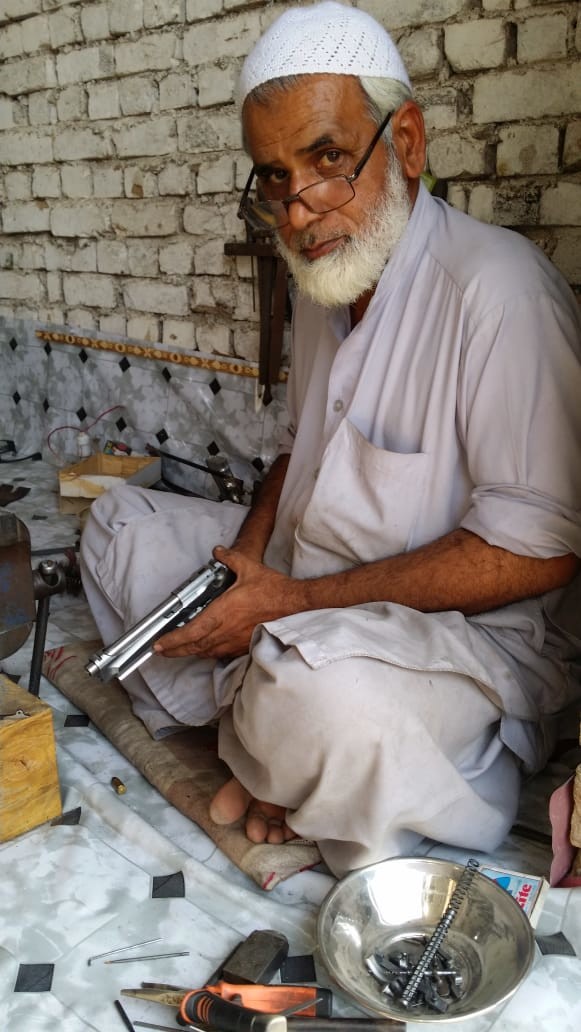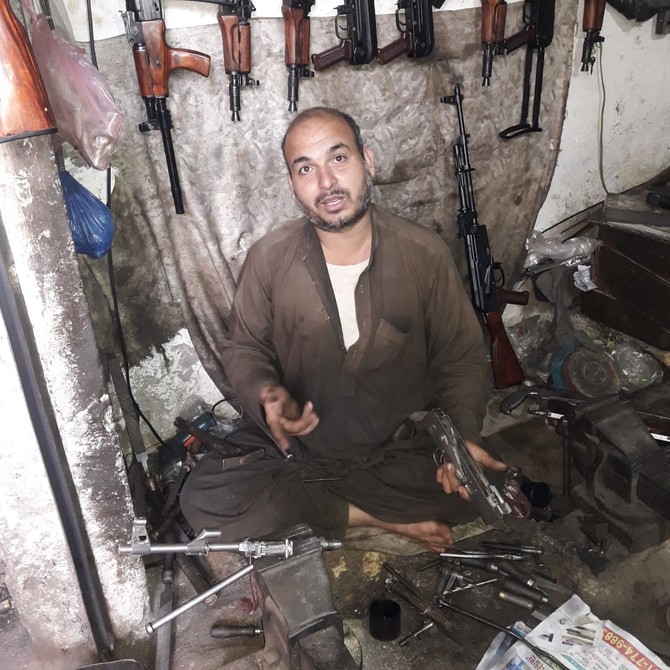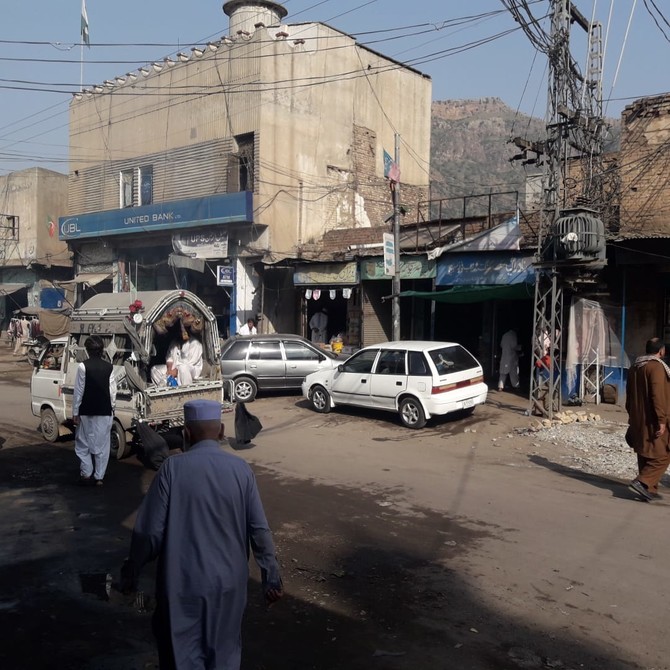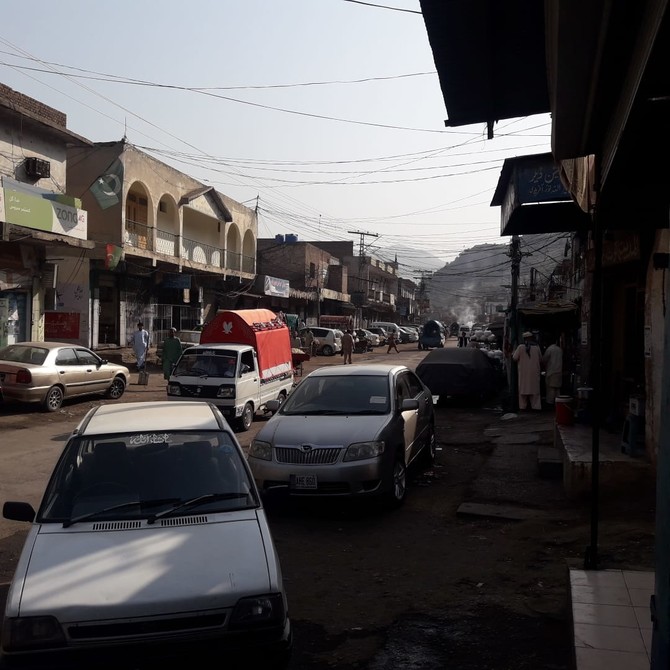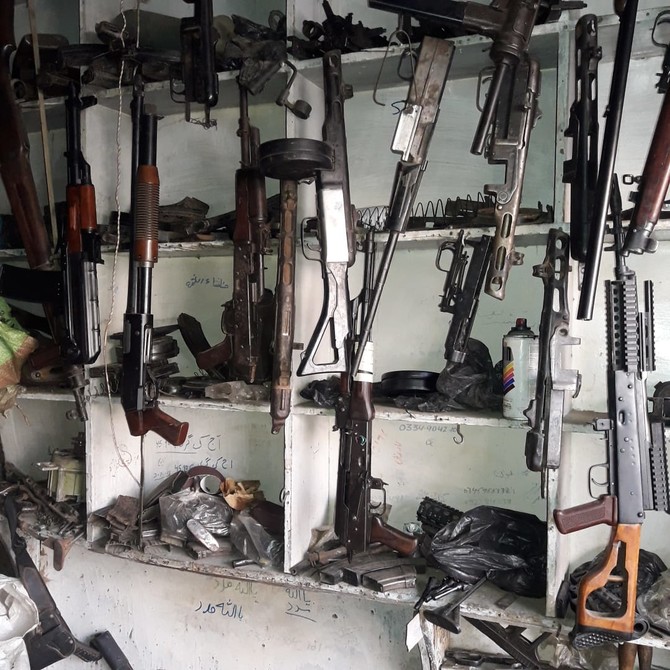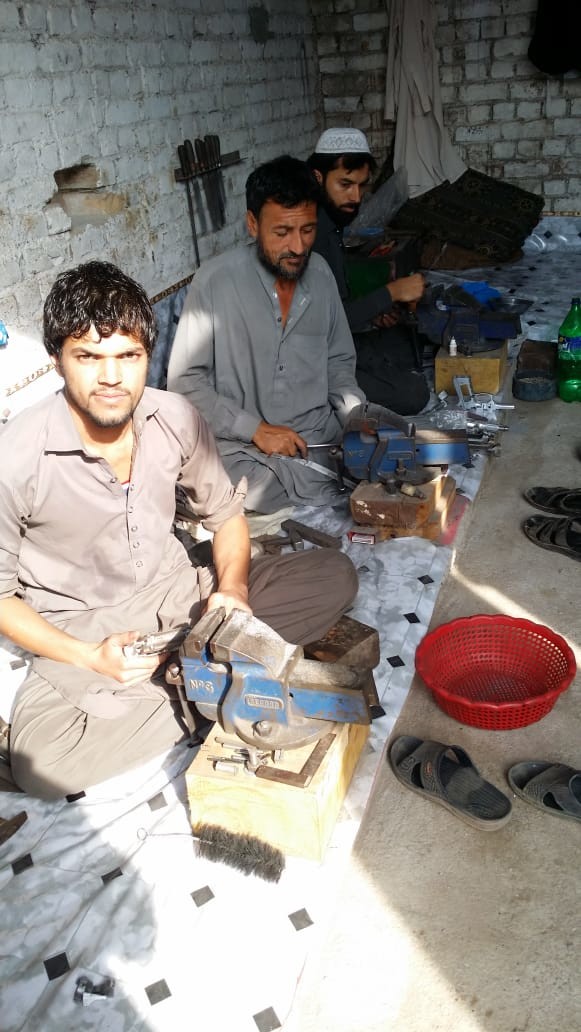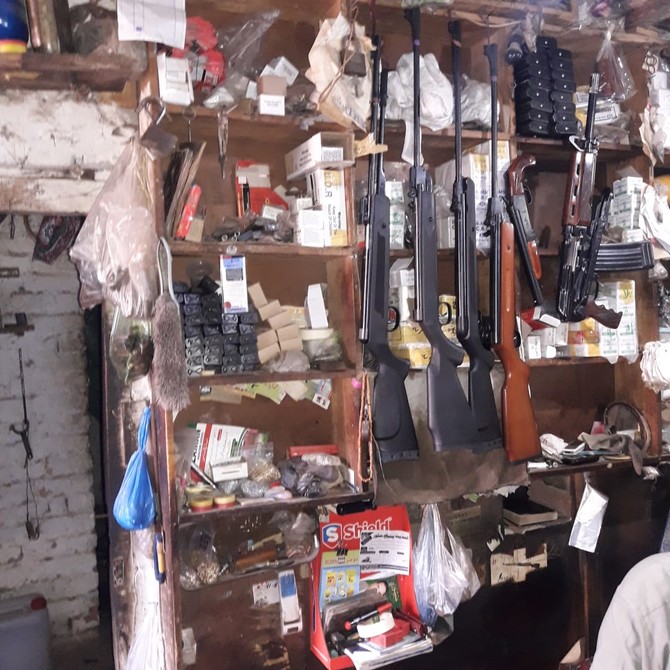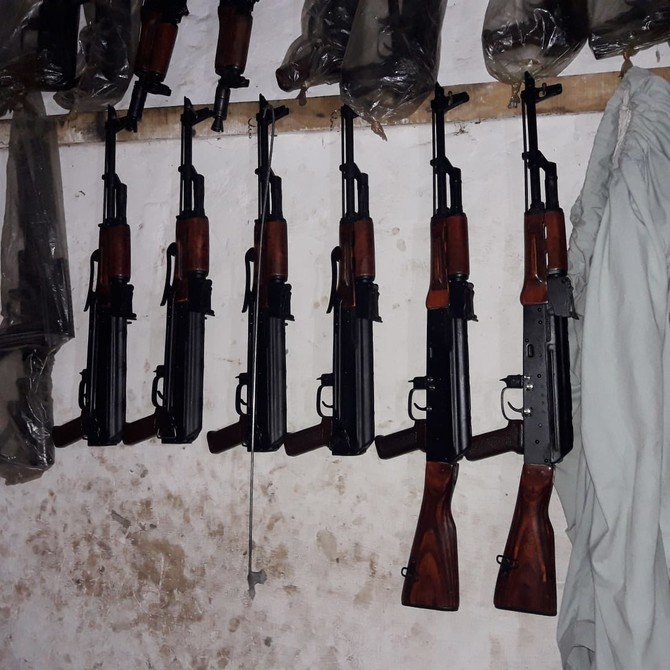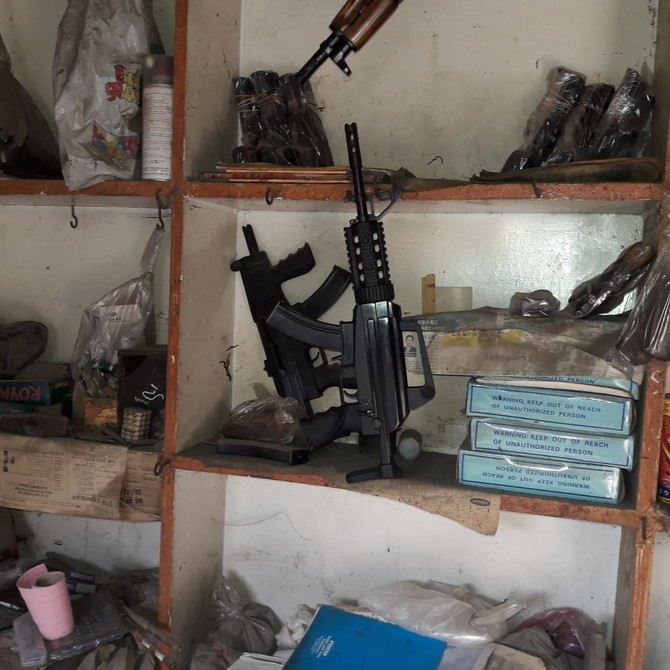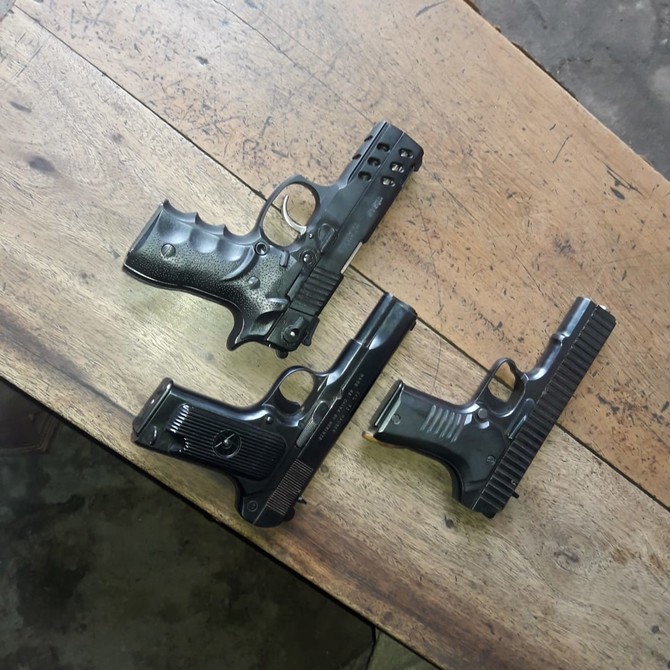DARA ADAM KHEL: It’s all guns and no roses for the shop owners of the weapons market that lines the bazaar in the dusty hamlet of Dara Adam Khel.
Inhabited by the Afridi tribe, the market has become the core identity of Dara Adam Khel — an area located between Kohat and Peshawar to the south of the Khyber Pakhtunkhwa province.
On any given day, it is packed with traders and merchants who have gained recognition for the quality and range of their guns and ammunition, with a number of tribesmen starting their businesses from scratch and soldiering on to become millionaires.
During an extensive range of interviews, where they spoke exclusively to Arab News, a majority shied away from taking credit for their craft, reasoning that they were only paying homage to skills passed on by their ancestors by taking the business forward.
Dating back to the pre-independence era of Pakistan, ancestors of these tribesmen — during their armed expedition in large swathes of Asia — learned the skills, passing it on to the future generations who developed it into a full-fledged arms industry in the Khyber tribal region.
Today, 40,000 to 50,000 residents of the area – with a total population of 110,000 — are directly associated with the industry, with every second owner saying that he inherited the business from his ancestors.
Quoting his great-grandfather, Kamran Afridi, a leading arms dealer from the area, said that members from the tribe used to form a Lashkar (armed resistance group) to fight the British imperial powers in parts of the Federally Administered Tribal Area, prior to 1947.
“There were times when tribal elders sent armed expeditions to parts of the sub-continent while the British forces used to come here to invade. Those types of armed clashes led them to learn ordnance and weapon-making skills, primarily from the Britishers. Then, our forefathers started replicating those skills when they would return from missions abroad,” Kamran said.
He added that while initially, it was a very tedious and slow-moving process to repair and manufacture small guns at their residential quarters or hujras; in time, his predecessors learned to develop their skills and eventually set up shops, hiring experienced and untrained laborers.
Later in the 50s, a few gunsmiths arrived from Punjab who were technically-trained in the craft and demonstrated comparatively-advanced methods of repairing and polishing second-hand weapons.
“Currently, according to my assessment, 6,000- 7,000 skilled laborers such as gunsmiths and professional manufacturers with technical expertise are involved in the arms hardware and ammunition-making process,” Kamran said, adding that, today, craftsmen from the market boast an incomparable expertise by being adept at assembling any type of weapon, on demand, with the help of a mere sketch.
The most popular items on sale include the 9-MM, 30-Bore guns, Repeaters, Kalashnikov and M-16 rifles. However, the industry prefers to manufacture non-prohibited weapons specifically for license holders, he said.
And while all the weapons are locally made, some hardware parts — such as springs and other items – are either sourced from Afghanistan or imported from western countries. However, according to Kamran, the biggest problem faced by the industry today is a questionable power supply and the government’s lack of commitment to regularize the market.
“The authorities never extend support to develop the industry. Rather, the recent military operations against militants in parts of the Khyber tribal district have dealt a severe blow to the business because of restrictions on the movement of people,” he said, suggesting that the government should instead introduce innovative measures to develop the market in the larger interest of the country.
“The weapons market can help bolster foreign exchange if the government helps improve its quality by introducing standard materials,” he added.
He reminisces a time, back in 2007, when former dictator Pervez Musharraf had approved Rs 50 million in funds to establish the Pakistan Hunting and Sporting Association, which was primarily aimed at modernizing the Dara Adam Khel weapons industry. That initiative, however, fizzled out due to political wrangling and bureaucratic red tape.
Last week, the federal government hinted at the possibility of allocating nearly 150 acres of land for the construction of an industrial zone catering to the weapons market, in the Mattani area of Peshawar, located near Dara Adam Khel. If the plans see the light of day, it would take two years to set up the infrastructure in the area.
Kamran said that the government has yet to kickstart the implementation process, even as the arms industry continues to irk residents of the area who complain of potential buyers randomly firing guns in the area due to the absence of a designated testing zone; and the lack of a proper sewerage system to drain chemicals and other wastes from the industry.
He added that while it will be a step in the right direction to designate an area specifically for the weapons industry, the move would also have far-reaching and negative consequences on small businesses.
That, however, does not seem to be a cause for concern for several gunsmiths who said that while they were working as unskilled laborers earlier, they have now gone on to become tycoons in the field.
One such rags-to-riches story is that of Muzaffar Khan Afridi who recalls a time in 1993 when he was working as a daily-wage gunsmith at arms and ammunition depot in Dara Adam Khel. “Today I have 30 gunsmiths working at my two ammunition stores,” he said.
Citing a lack of choice in terms of earning a livelihood in this impoverished part of the country, several said they had no other skills to teach their children and would be at the receiving end of the deal if small businesses were moved to the proposed industrial zone. “I have 17 members in my family and my business is the sole source of income,” Muzaffar said.
Samiullah Afridi, another weapons and ammunition dealer, thanked his great-grandfather for starting the family business from a hujra, which was eventually expanded to four stores in the market today. “According to a ballpark estimate, Dara Adam Khel has around 2,000- 3,000 arms depot and shops,” he added.
Throwing light on the intricacies involved in the arms-making process, Samiullah said that the metal and steel being used in the manufacturing of the weapons is recycled to improve its quality, standard and resistance power.
It’s a tedious process and involves days of hard work which begins by molding rigid steel — by tampering and designing it — to absorb massive and repeated shocks. The steel used by gun manufacturers in the US has an aluminum grading of 70-75, while the material used in Dara Adam Khel is for smaller guns and ranges between 40 to 45.
Highlighting the economic situation of the country, Samiullah said that while there continues to be a lack of employment opportunities across Pakistan, the weapons industry thrived dramatically due to an influx of educated youth who set up their own businesses in the market.
With the arrival of a more-informed generation of gun manufacturers who introduced innovative ideas, the industry was able to produce automatic rifles such as 9-MM, 30-Bore, 44, 223, 222, 32 and 12-Bore pistols, M-16, Kalakov, 7-MM, 8-MM, revolver, Makarov pistol and other brands of weapons.
He added that the government would no longer have to import small weapons if it allowed the import of small hardware items — such as steel and aluminum used in Brazil, Spain, USA, Turkey, and Russia – instead. This would help the industry produce locally-made weapons.
Secondly, the local weapons industry lacks a computerized system to check the standard, quality and resistance of steel. Despite all these deterrents, the most expensive gun manufactured locally is the M-16 also known as 223, which costs Rs 130,000.
Samiullah said that locally-made guns help small dealers – who operate from home — as all members of the family can assist each other, thereby saving their hard-earned money on rent, electricity and other amenities which otherwise they would have to spend toward the upkeep of a shop.
“We can produce excellent weapons to compete with the global market if the government regularizes the industry and offers incentives such as an uninterrupted power supply and legal cover,” Samiullah said.
Kamran concurs, adding that weapons manufactured in Dara Adam Khel are of a superior quality and can be exported to foreign countries only “if the government earnestly focuses on helping develop the industry.”
Dara Adam Khel’s weapons industry guns for greatness
Dara Adam Khel’s weapons industry guns for greatness

- Relocating market would have an adverse impact on small businesses, owners say
- Thriving manufactory took decades to develop and put Pakistan on the world map
Pakistan ranks seventh in civilian harm, second in IED casualties worldwide — report

- UK-based Action on Armed Violence monitor says Pakistan witnessed 790 civilian casualties in 248 incidents last years
- The Baloch Liberation Army killed and injured 119 civilians, followed by Daesh (45 casualties) and Pakistan Taliban (10)
ISLAMABAD: Pakistan ranked seventh in the world for civilian casualties from explosive weapons and second most affected nation in terms of casualties from improvised explosive devices (IEDs) last year, UK-based monitor Action on Armed Violence (AOAV) said this week.
In its annual report, the AOAV said it had recorded 67,026 deaths and injuries as a result of the use of explosive weapons around the world, which was the highest since 2010.
The report said 89% of 59,524 civilians were either killed or wounded by explosive weapons in 2024, adding that 41% of them, or 24,147 individuals, were killed in incidents of explosive violence.
Pakistan was the seventh most affected country for civilians harmed by explosive weapons last year, with 790 civilian casualties (210 killed) in 248 incidents, a 9% decrease from 2023. However, there was a 11% increase in incidents compared to 218 in 2023.
“The majority of civilian harm was attributed to non-state actors, who were reportedly responsible for 76% (603) of civilian casualties. In particular, the Balochistan Liberation Army (BLA) killed and injured 119 civilians in Pakistan last year,” the report read.
“The Islamic State (Daesh) affiliate in the region, Islamic State – Khorasan Province (IS-KP), was the reported perpetrator of 45 civilian casualties in Pakistan last year, down from 194 recorded civilian casualties in 2023. The Tehreek-e-Taliban Pakistan (TTP) killed and injured 10 civilians last year, down from 32 in 2023.”
Unknown non-state actors accounted for 54% of civilian casualties (423), down from 541 recorded in 2023, in Pakistan. The BLA was the reported perpetrator of 15% (119) civilian casualties, marking a 440% increase from 22 in 2023.
Pakistan is currently battling twin insurgencies: one led my religiously motivated groups, including the TTP, mainly in its Khyber Pakhtunkhwa (KP) province and the other by ethno-nationalist Baloch separatist groups like the BLA in Balochistan.
Islamabad has frequently accused Afghanistan and India of supporting the TTP, BLA and other militant groups who have mounted their attacks in Pakistan in recent years. Kabul and New Delhi deny the accusations.
In terms of IEDs, Lebanon saw the highest level of harm globally, with 3,373 civilians killed and injured across only 16 incidents, accounting for 58% of civilian casualties from IED attacks globally, according to the report.
Pakistan saw the second highest level of civilian harm due to IED attacks, with AOAV recording 485 civilian casualties (139 fatalities) in 132 incidents.
“This is a 30% decrease in civilian casualties, but an 8 % increase in incidents,” the monitor said.
Other countries which saw elevated levels of civilian harm from IEDs in 2024 included Nigeria (385 civilian casualties), Iran (378), Somalia (270), Syria (253), Afghanistan (170), and Myanmar (84).
Authorities issue thunderstorm alert for Pakistan’s Punjab, Khyber Pakhtunkhwa provinces

- Last week, a child was killed and 11 people were injured as a thunderstorm hit upper parts of the country
- Pakistan has seen erratic changes in weather leading to frequent heatwaves, untimely rains in recent years
ISLAMABAD: The National Disaster Management Authority (NDMA) has issued an impact-based weather alert predicting isolated showers, thunderstorms, windstorms and dust storms over the next 24 hours in various parts of Punjab and Khyber Pakhtunkhwa provinces and the federal capital of Islamabad.
In Punjab, the areas that may be affected include Rawalpindi, Attock, Jhelum, Chakwal, Mianwali, Sialkot, Faisalabad, Sargodha, Gujranwala, Gujrat, Lahore, Narowal and adjoining regions, according to the NDMA.
In Khyber Pakhtunkhwa, isolated rainfall, windstorm, thunderstorm and dust storm are expected in Chitral, Battagram, Kohistan, Kohat, Kurram, Bannu, Mardan, Peshawar, Swabi, Charsadda, Nowshera, Mansehra, Abbottabad, Dera Ismail Khan, Bajaur, Mohmand and surrounding areas.
“These weather conditions are likely to bring temporary relief from the prevailing heatwave,” the NDMA said in a statement.
“However, strong winds and thunderstorms may uproot weak trees and cause temporary power outages. Dust storms may damage fragile structures, rooftops, vehicles, and electrical infrastructure. Reduced visibility during storms may increase the risk of road accidents.”
The authority advised the public to not go near trees, billboards and other unstable structures during storms.
“Park vehicles in secure, covered locations and minimize outdoor movement,” it said. “NDMA is closely monitoring the situation and coordinating with relevant departments to ensure timely response and public safety.”
Last week, a child was killed and 11 people were injured as a thunderstorm hit upper parts of Pakistan, rescue officials said. In April, an intense hailstorm battered Pakistan’s capital and its surrounding areas. Several vehicles were damaged and house windows smashed as hailstones rained down from the sky on April 16.
Pakistan has seen erratic changes in its weather patterns which have led to frequent heat waves, untimely rains, storms, cyclones and droughts in recent years. Scientists have blamed the events on human-driven climate change.
In 2022, devastating floods, blamed on human-driven climate change, killed more than 1,700 Pakistanis, affected another 33 million and caused the country over $30 billion in economic losses.
IMF team concludes Pakistan visit after talks on budget proposals, economic policy and reforms

- The visit concluded hours after the Pakistani government announced it will now present Budget 2025-26 on June 10
- Pakistan aims for 1.6% primary surplus of GDP in new budget as next IMF reviews expected in second half of 2025
ISLAMABAD: An International Monetary Fund (IMF) team has concluded its visit to Pakistan after discussions with authorities regarding the upcoming budget, broader economic policy and reforms under its ongoing $7 billion loan program, the lender said on Saturday.
The visit concluded hours after the Pakistani government announced it would now present the Budget 2025-26 on June 10, a delay from the earlier announced date of June 2, seen by many as a result of authorities’ struggle to finalize fiscal targets.
The Economic Survey 2024-25, which details performance of various sectors of the economy in the outgoing fiscal year, will be unveiled on June 9, a day before the budget presentation, according to the Pakistani finance ministry.
The discussions between Islamabad and the IMF team, led by Mission Chief Nathan Porter, began on May 19 and focused on recent economic developments, IMF program implementation, and the budget strategy for the next fiscal year.
“The authorities reaffirmed their commitment to fiscal consolidation while safeguarding social and priority expenditures, aiming for a primary surplus of 1.6 percent of GDP in FY2026,” Porter was quoted as saying by the IMF.
“Discussions focused on actions to enhance revenue — including by bolstering compliance and expanding the tax base — and prioritize expenditure. We will continue discussions toward agreeing over the authorities’ FY26 budget over the coming days.”
The IMF this month approved first review of Pakistan’s loan program, unlocking a $1 billion payment. A fresh $1.4 billion loan was also approved under the IMF’s climate resilience fund.
The IMF loan is vital for Pakistan which is trying to revive its debt-ridden economy that is expected to expand 2.68 percent by June, about one percent lower than the government’s earlier projection.
The IMF’s latest country report, issued last week, mentioned certain structural benchmarks for Pakistan’s economic reform program that officials said represented the natural progression of the measures already agreed upon, when Pakistan signed the Memorandum for Economic and Financial Policies (MEFP) in September.
“These benchmarks are not surprises. They are deliberate follow-ons to earlier milestones,” Khurram Schehzad, an adviser to Pakistan’s finance minister, told Arab News this week, citing Pakistan’s parliamentary approval of the next budget in line with the IMF staff agreement as a second step toward the country’s goal of achieving a primary surplus of 2 percent of GDP by FY27.
“The first step was the FY25 budget [presented in June last year], which targeted a 1.0 percent surplus.”
Discussions between Pakistan and the visiting IMF team also covered ongoing energy sector reforms aimed at improving financial viability and reducing the high-cost structure of Pakistan’s power sector as well as other structural reforms which will help foster “sustainable growth and promote a more level playing field for business and investment,” according to the lender.
Pakistani authorities emphasized their commitment to ensuring sound macroeconomic policy-making and -building buffers.
“In this context, maintaining an appropriately tight and data-dependent monetary policy remains a priority to ensure inflation is anchored within the central bank’s medium-term target range of 5–7 percent,” the lender said.
“At the same time, rebuilding foreign exchange reserve buffers, preserving a fully functioning FX [foreign exchange] market, and allowing for greater exchange rate flexibility are critical to strengthening resilience to external shocks.”
The next IMF mission is expected to visit Pakistan in the second half of 2025 for next reviews its loan program and climate fund facility.
Beyond ceasefire, India and Pakistan battle on in digital trenches

- Both states continue to push competing narratives after the four-day military standoff, which ended on May 10 with a US-brokered truce
- Digital rights experts note how it is often laced with hate, targeting vulnerable communities like Muslims in India and Hindus in Pakistan
ISLAMABAD: As Indian and Pakistani guns fell silent after trading fire for days this month, the war over facts and fiction is far from over and fierce battle rages on social media as to who won, who distorted the truth, and which version of events should be trusted.
As both states continue to push competing narratives, experts warn that misinformation, censorship and AI-generated propaganda have turned digital platforms into battlegrounds, with real-world consequences for peace, truth and regional stability.
The four-day military standoff, which ended on May 10 with a US-brokered ceasefire, resulted from an attack in Indian-administered Kashmir that killed 26 people last month. India accused Pakistan of backing the assault, a charge Islamabad has consistently denied.
While the truce between the nuclear-armed archfoes has since held, digital rights experts have sounded alarm over the parallel information war, which continues based on disinformation, censorship and propaganda on both sides, threatening the ceasefire between both nations.
Asad Baig, who heads the Media Matters for Democracy not-for-profit that works on media literacy and digital democracy, noted that broadcast media played a central role in spreading falsehoods during the India-Pakistan standoff to cater to an online audience hungry for “sensational content.”
“Disinformation was overwhelmingly spread from the Indian side,” Baig told Arab News. “Media was playing to a polarized, online audience. Conflict became content, and content became currency in the monetization game.”
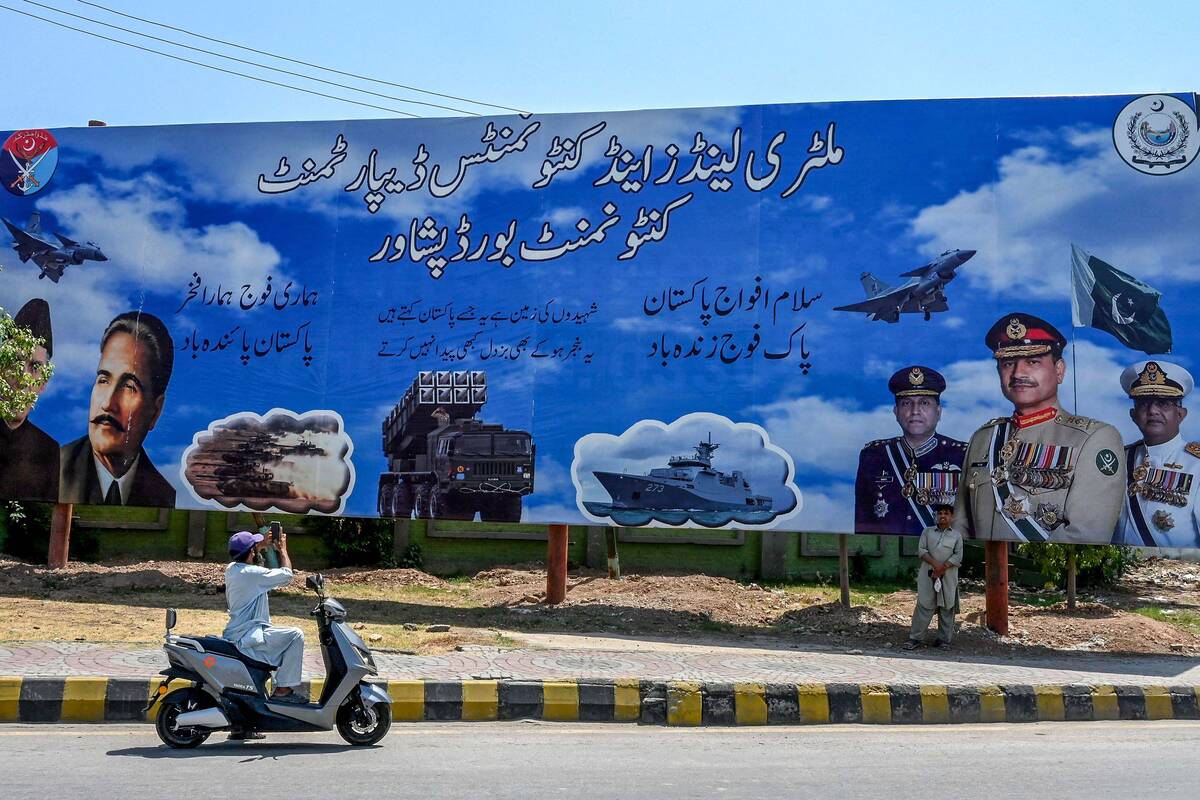
Several mainstream media outlets, mostly in India, flooded the public with fake news, doctored visuals and sensationalist coverage, fueling mass anxiety and misinformation, according to fact-checkers and experts, who say the role of media at this critical geopolitical juncture undermined journalistic integrity and misled citizens.
“I think this is a perfect example of the media becoming a tool of propaganda in the hands of a state,” said prominent digital rights activist Usama Khilji, calling on those at the helm of television and digital media outlets to independently verify state claims using tools like satellite imagery or on-ground sources.
In Pakistan, X, previously known as Twitter, had been banned since February 2024, with digital rights groups and global organizations calling the blockade a “blatant violation” of civic liberties and a threat to democratic freedoms.
But on May 7, as Pakistan’s responded to India’s missile strikes on its territory that began the conflict, the platform was suddenly restored, allowing users to access it without a VPN that allows them to bypass such restrictions by masking their location. The platform has remained accessible since.
“We were [previously] told that X is banned because of national security threats,” Khilji told Arab News, praising the government’s “strategic move” to let the world hear Pakistan’s side of the story during this month’s conflict.
“But when we actually got a major national security threat in terms of literal war, X was unblocked.”
Indian authorities meanwhile blocked more than 8,000 X, YouTube and Instagram accounts belonging to news outlets as well as Pakistani celebrities, journalists and influencers.
“When only one narrative is allowed to dominate, it creates echo chambers that breed confusion, fuel conflict, and dangerously suppress the truth,” Khilji explained.
VIRTUAL WAR
Minutes after India attacked Pakistan with missiles on May 7, Pakistan released a video to journalists via WhatsApp that showed multiple blasts hitting an unknown location purportedly in Pakistan. However, the video later turned out to be of Israeli bombardment of Gaza and was retracted.
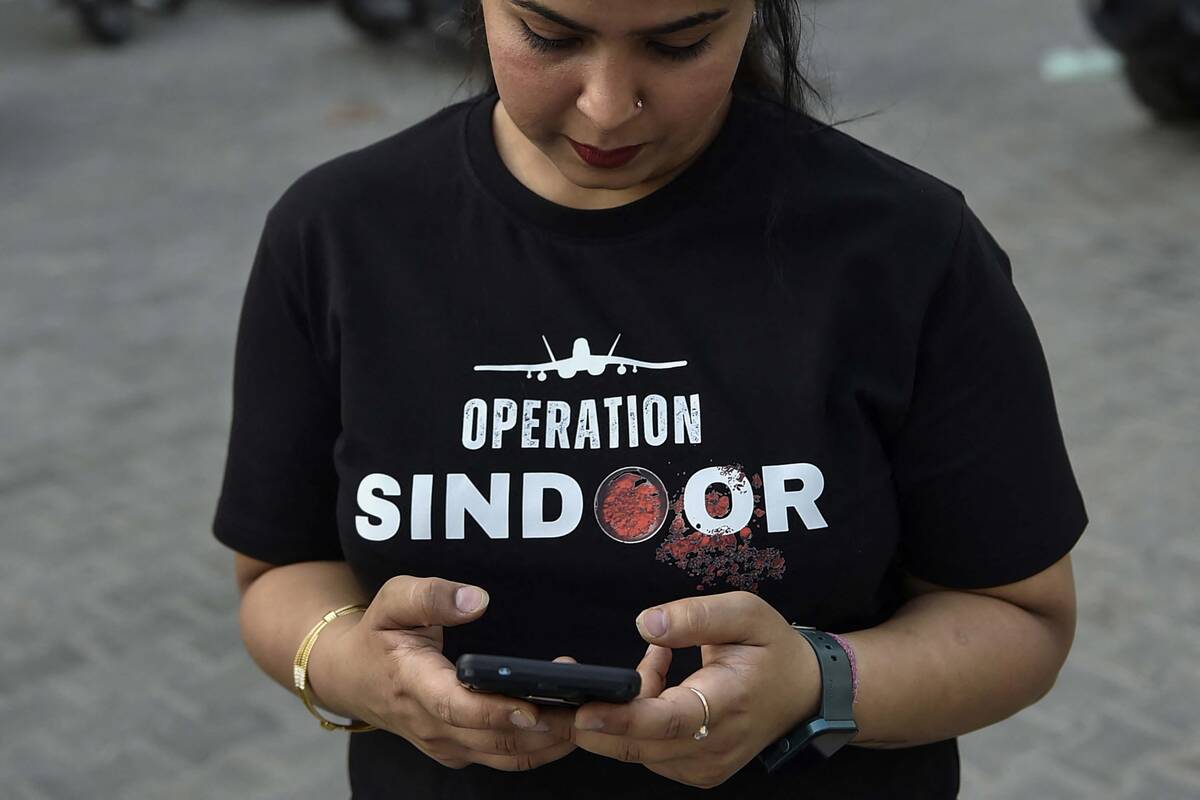
On May 8, Indian news outlets played a video in which a Pakistani military spokesperson admitted to the downing of two of their Chinese-made JF-17 fighter jets. X users later pointed out that the video was AI-generated.
Throughout the standoff both mainstream and digital media outlets found themselves in the eye of the storm, with many official and verified accounts sharing and then retracting false information. The use of AI-generated videos and even video game simulations misrepresented battlefield scenarios in real time and amplified confusion at a critical moment.
Insights from experts paint a disturbing picture of how information warfare is becoming inseparable from conventional conflict. From deliberate state narratives to irresponsible media and rampant misinformation on social platforms, the truth itself is becoming a casualty of war.
AFP Digital Verification Correspondent Rimal Farrukh describes how false information was often laced with hate speech, targeting vulnerable communities like Muslims in India and Hindus in Pakistan.
“We saw dehumanizing language, misleading visuals, and recycled war footage, often from unrelated conflicts like Russia-Ukraine or Israel-Gaza, used to stoke fear and deepen biases,” she told Arab News.
Pakistan to export female beauticians to Saudi Arabia — state media

- Hairdressers, makeup and nail artists under the age of 40 are required, OEC says
- Pakistan has long maintained a strong labor export relationship with the Kingdom
ISLAMABAD: Pakistan’s Overseas Employment Corporation (OEC) will send skilled female beauticians to Saudi Arabia in response to a demand from a private firm in the Kingdom, state media reported on Friday, outlining the qualifications required for applicants.
The initiative comes as part of Pakistan’s long-standing labor export relationship with Saudi Arabia, which remains the top destination for Pakistani workers and contributes over $700 million in monthly remittances to the South Asian country.
Pakistan regularly sends skilled labor to Gulf nations, including medical professionals, engineers and technicians. The latest move targets the beauty and personal care sector.
“Overseas Employment Corporation, an attached department of the Ministry of Overseas Pakistanis and Human Resource Development, will export skilled workers (female beauticians) to the Kingdom of Saudi Arabia,” the Associated Press of Pakistan (APP) said.
It informed a Saudi firm is seeking beauticians for various roles, including senior hairdresser, nail technician (gel and acrylic), eyelash specialist, makeup artist, waxing and bleaching specialist and wig technician.
The required qualifications include a minimum of three years’ experience and an age limit of under 40 years.
APP said the firm will offer senior beauticians a monthly salary of 3,000 Saudi Riyals or approximately $800.
Employees will also receive free shared accommodation with furnishings and air conditioning, food allowance, and round-trip airfare, along with surface transport within Saudi Arabia if needed.
The news report said applications must be submitted via the OEC website by June 8.
Pakistan and Saudi Arabia enjoy robust economic, defense and cultural ties.
The Kingdom hosts over 2.7 million Pakistani expatriates and remains the largest source of remittances to Pakistan, a crucial lifeline for the country’s cash-strapped economy.


